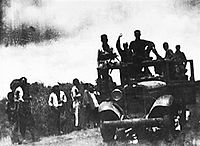The Battle of Wuyuan (March 16 – April 3, 1940; Chinese: 五原戰役) was a Chinese counterattack that defeated the Japanese invasion of the Wuyuan area. This happened in reaction to the Chinese 1939-40 Winter Offensive in Suiyuan during the Second Sino-Japanese War. The Japanese call it 第2次後套作戦 ("The Second Battle of Wuyuan").
| Battle of Wuyuan | |||||||
|---|---|---|---|---|---|---|---|
| Part of Second Sino-Japanese War | |||||||
 Chinese 35th Army | |||||||
| |||||||
| Belligerents | |||||||
|
|
| ||||||
| Commanders and leaders | |||||||
|
|
| ||||||
| Strength | |||||||
| 28,000 including Chinese Muslim Cavalry | 5,000 - 10,000 | ||||||
By 28 January 1940 the Japanese had built up forces from the 26th Division at Baotou sufficient to launch the 第1次後套作戦 or "First battle of Wuyuan in Inner Mongolia" to recover lost territory and move west to take Wuyuan which fell on February 3 and Linhe further west on 4 February.
Units
editJapanese Forces:
Mongolia Garrison Army 駐蒙軍 - Naosaburo Okabe
- 26th Division - Lt. Gen. Shigenori Kuroda
- IJA Cavalry Group
Chinese Forces:
8th War Area - Deputy Commander Fu Zuoyi
- 35th Corps - Fu Zuoyi
- New 4th Division
- New 31st Division
- 11th Provisional Division
- Garrison Brigade
- 81st Corps - Ma Hongbin
- 101st Division
- 6th Cavalry Corps - Ma Buqing
- 3rd Cavalry Division
- Guerrilla Force
Course of the battle
editOn March 16, 1940, as the Japanese were attacking the New 4th Division west of Linhe, the rest of the Chinese 35th Corps with the New 31st Division and a regiment of the Garrison Brigade, secretly moved east along the Wu-chia River. On the night of the 20th they entered Wuyuan by surprise and after a seesaw fight over the strongpoint captured the city at 1600 hours on the 21st. The Japanese garrison retreated northward. Chinese forces then moved on to capture a strongpoint around Hsin-an-chen on the 22nd. This cut the road along the Yellow River to Wuyuan.
In an attempt to recover the situation the Japanese sent 600 troops from Dashetai via Siyitang in 80 trucks to make a forced crossing of the Wu-chia River at Ta-tsai-chu 10 km (6.2 mi) north of Wuyuan. For three days they fought the 101st Division without success. By the 25th they had been reinforced to 3,000 men and made the crossing with artillery and air support. Wuyuan again fell to the Japanese on the 26th and the Chinese fell back to the banks of Fang-chi-chu and continued their attacks at Xin'an, Xishanzui, Xixiaozhao, and Man-ko-su.
The Middlesboro Daily News which reported on Japan's planned offensive into the Muslim region, predicted that the Japanese would suffer a massive crushing defeat at the hands of the Muslims.[1]
Muslim Generals Ma Hongkui and Ma Hongbin defended west Suiyuan, especially Wuyuan in 1940 against the Japanese. Ma Hongbin commanded the Muslim 81st corps and incurred heavy casualties, but after fierce fighting eventually repulsed the Japanese and defeated them.[2][3]
Unable to withstand the pressure of Chinese attacks, the Japanese at Wuyuan retreated on March 30 and 31. On April 1 a guerrilla force and cavalry column recaptured Wuyuan, and the 11th Provisional Division recaptured Wu-pu-lang-kou. On April 3, cavalry recovered Xishanzui as the Japanese retreated to the east.
Japan used poison gas against the Chinese armies at the Battle of Wuyuan and Battle of West Suiyuan.[4][5]
Sources
edit- ^ "Middlesboro Daily News - Google News Archive Search".
- ^ George Barry O'Toole, Jên-yü Tsʻai, ed. (1941). The China monthly, Volumes 3-5. The China monthly incorporated. Retrieved 2010-06-28.(Original from the University of Michigan)
- ^ Aleksandr I͡Akovlevich Kali͡agin (1983). Along alien roads (illustrated ed.). East Asian Institute, Columbia University. p. 261 of 294. ISBN 0-913418-03-X. Retrieved 2010-06-28.(Original from the University of Michigan)
- ^ 民国宁夏风云实录 第五卷杨少青 胡迅雷 著目录上篇下篇 (in Chinese). Archived from the original on 2018-06-04.
- ^ 国民革命军马鸿宾部队81军的绥西抗战!一段不该湮没的宁夏抗战史!. 7 December 1984. Archived from the original on 2015-09-07.
- Hsu Long-hsuen and Chang Ming-kai, History of The Sino-Japanese War (1937–1945) 2nd ed., 1971. Translated by Wen Ha-hsiung, Chung Wu Publishing; 33, 140th Lane, Tung-hwa Street, Taipei, Taiwan Republic of China. p. 319-334, "Chinese Winter Offensive" (Late Nov 1939 - Late March 1940) Map 19.
External links
edit- "Topographic Maps of China during the Second World War". Series L500. Perry–Castañeda Library Map Collection: U.S. Army Map Service. 1954. Archived from the original on 11 March 2010. Retrieved 17 March 2010.
- Maps of Wuyuan battle area during World War II Wu-Yuan nk49-7, Hsi-Nao-Pao nk49-10